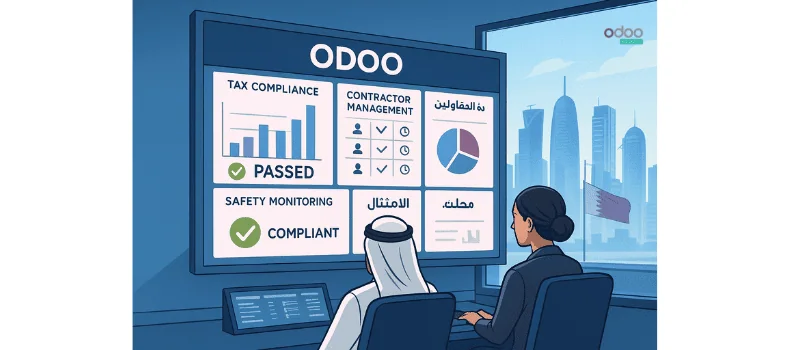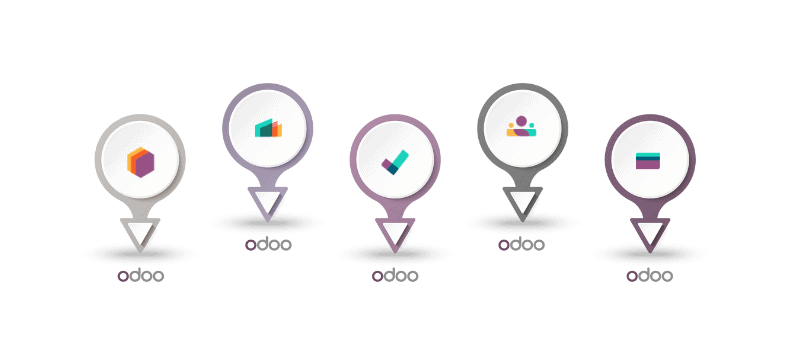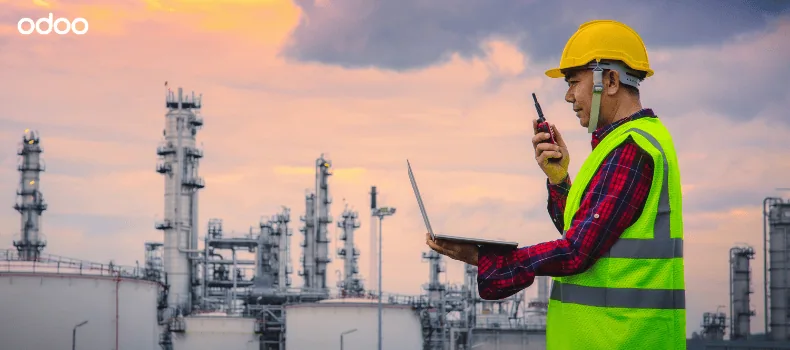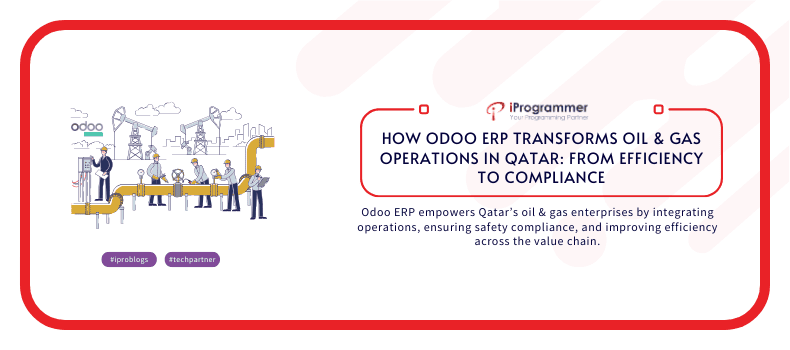How Odoo ERP Transforms Oil & Gas Operations in Qatar: From Efficiency to Compliance
- Why Oil & Gas Enterprises in Qatar Need a Strong ERP Backbone
- Why Odoo is a Reliable ERP in Qatar
- Core Odoo ERP Modules for Oil & Gas Enterprises
- Efficiency Gains with Odoo ERP in Oil & Gas
- Enhancing Safety with Odoo ERP
- Compliance and Regulatory Readiness in Qatar
- Why Choosing the Right Odoo Qatar Partner in Qatar Matters
- Future-Proofing Oil & Gas Enterprises with Odoo ERP
- Conclusion
- About iProgrammer
Qatar is among the world’s best energy powers, leading in liquefied natural gas (LNG) export and a power player in world petroleum supply. For companies in this sector, the stakes are high. They have to navigate complex upstream and downstream operations, navigate tight health and safety protocols, deal with tight regulatory frameworks, and contain costs in an unpredictable market.
These challenges are not abstract; they translate into daily pressures. Equipment can go down for millions on an offshore rig. Overlooks in contractor oversight can build to safety incidents. Mistakes in compliance can lead not only to monetary fines but to reputation damage. During such circumstances, it is not possible anymore to operate on poorly fragmented systems or old equipment.
What companies need is a system that integrates all processes—procurement and maintenance, safety reporting, and finance—to one, reliable platform. And this is where enterprise resource planning (ERP) steps in. ERP ties data together, simplifies work processes, and provides real-time visibility across the value chain, enabling better decisions at every level.
Among solution options, Odoo has been particularly applicable. Its modular nature lets oil and gas businesses implement just the functionality they require, from predictive maintenance to HSE compliance management. Its scalability allows the system to grow along with the growing business, while localization features support Qatar’s special regulatory and business environment. Unlike traditional systems that demand rigidity, Odoo ERP supports operational complexity, giving businesses room to integrate efficiency, safety, and compliance.
The oil and gas industry is not one line of business—it is an integrated series of upstream exploration, midstream shipping, and downstream refining and sales. Every phase has its own requirements, but they all must act in tandem. Without the system integration, backlogs in one part rapidly spill over into the rest of the value chain. A tardy delivery of equipment in the field, say, can retard drilling timetables and affect refinery production weeks later. An ERP system provides the integration required to keep these moving parts in harmony such that operations continue without costly delays.
Safety and environmental compliance introduce another level of complexity. Businesses in Qatar operate under some of the toughest HSE requirements in the region, both domestic and international. Manual reporting or ad-hoc tracking enables incidents to fall through the cracks or audits to turn into a nightmare. An ERP system incorporates compliance into everyday work—reporting incidents, automating checklists, and generating audit-compliant reports that minimize risk and maximize accountability.
Geography introduces additional complications. Offshore platforms, onshore refineries, and supply bases are run in silos, each having their own crew, contractors, and supply base. This absence of centralized visibility is difficult to control these sites with, and they end up repeating work, having inconsistent data, and suboptimal decision-making. AERP backbone ties every location to the same information pipeline, so top management sees a clear, real-time view of performance in all locations.
Lastly, vendor and contractor management is essential in a sector where there are large numbers of external partners. Monitoring contracts, certificates, and performance using spreadsheets or disparate tools is time-consuming and unsafe. ERP systems bring all this data together, making contractor monitoring more dependable and transparent.
Why Odoo is a Reliable ERP in Qatar

When Qatar businesses consider ERP solutions, the initial factor is typically whether the system can configure to the size and sophistication of oil and gas operations. Conventional solutions like SAP or Oracle have been linked to the industry for years, yet their inflexibility and excessive cost of ownership present obstacles for companies that require speed, flexibility, and localization. That is where Odoo stands apart.
Odoo is modular. Businesses are not shoehorned into a monolithic implementation; they can implement what they require, when they require it. A business might start with modules for maintenance and inventory, then expand to HSE tracking, finance, and workforce management as needs change. This phased adoption lowers risk and allows the ERP to grow with the business instead of tying it to a fixed form.
Affordability is a vital consideration too. Oil and gas organizations in Qatar spend considerable amounts on infrastructure, hardware, and regulation. Spending enormous amounts of money on software licenses and bespoke development, which is typical of legacy ERPs, is hardly ever feasible. Odoo provides a less expensive alternative without trading off capability—enabling businesses to reallocate funds to more critical operational requirements.
Scalability gives Odoo even a more solid ground. From the management of a single refinery to organizing an offshore rigs and supply bases system, the platform is scalable to perfection. Its open architecture also makes it possible to integrate it with IoT systems, real-time monitoring software, and industry-specific applications that are critical in petroleum operations.
What renders Odoo most reliable in Qatar is its adaptability to the local business context. With Odoo Qatar Partners support, companies can implement ERP solutions tailored to local requirements: Arabic language support, alignment with local tax law, and functions per QatarEnergy’s regulatory landscape. Localization ensures that a system not only supports global best practices but instead is applicable to the practical realities of operating in Qatar.
Core Odoo ERP Modules for Oil & Gas Enterprises

Odoo’s power is in its modularity. Rather than a single inflexible system, companies can choose and bundle the applications that specifically serve their operational requirements. For oil and gas companies in Qatar, certain modules stand out as particularly valuable:
Inventory & Logistics
Spare parts and drilling rigs are lifelines for the oil and gas industry. A lost component can bring production on a rig to a stop or hold up refinery overhaul. Odoo’s stock module makes it possible to monitor in real time of equipment, spares, and consumables across warehouses and offshore supply bases. Sophisticated logistics features enable exact control of shipments, procurement, and replenishment cycles, reducing downtime from supply gaps.
Maintenance Management
Unexpected equipment breakdown in this industry is expensive—not just in repair but also in lost product. Odoo’s maintenance management module accommodates both preventive and predictive maintenance. Alerts based on data guarantee that equipment and rigs are maintained prior to failure. For refineries, this translates to fewer shutdowns, reduced operational risk, and improved asset reliability.
Project Management
Oil and gas companies manage projects of massive size, from exploration projects to refinery expansions. Odoo’s project management module provides leadership with insight into progress, timelines, and resources for several projects. Through integrated task assignment and cost monitoring, companies are able to keep multi-million-dollar projects on track and within budget, and align teams dispersed across several sites.
HSE Compliance Tracking
HSE compliance is not something optional, but rather it is the essence of doing business in Qatar’s energy sector. Odoo’s advanced tools allow companies to document incidents, track safety inspections, and manage corrective actions. Automated reporting makes it possible for organizations to prepare for audits without manually assembling. By integrating HSE into operational processes, companies can achieve accountability and reduce the occurrence of incidents.
HR & Contractor Management
A large number of the oil and gas staff are contractors, frequently deployed in various locations. Odoo’s HR module streamlines contractor management, from certification and training records to attendance and performance tracking. Only qualified workers are deployed through this, ensuring reduced safety risks and compliance issues.
Accounting & Compliance
Transparency in finances is important in a sector under continuous regulatory scrutiny. Odoo’s accounting module supports Qatar’s tax regulations and reporting requirements easily and interacts with operational data seamlessly. Automated expenditure tracking, asset tracking, and compliance features enable businesses to always be audit-ready and financially efficient.
Efficiency Gains with Odoo ERP in Oil & Gas
By aggregating data and automating key workflows, Odoo ERP gives businesses in Qatar the capabilities to deliver tangible efficiency gains.
Decision-making based on data is perhaps the most tangible benefit. Odoo dashboards aggregate data from drilling operations, maintenance schedules, logistics, and finance into a unified view. Top management teams can monitor production metrics in real time, identify deviations early on, and act before tiny issues develop into expensive setbacks.
Decreased downtime is another major effect. With predictive work-driven maintenance through Odoo’s maintenance module, the condition of equipment is monitored continuously. Alerts inform refineries and rigs when machines require servicing, allowing them to schedule repairs during scheduled downtime instead of reacting to unexpected breakdowns. Planned intervention ensures smooth operations while reducing repair costs.
Better supply chain visibility is also crucial. Odoo combines procurement, warehousing, and vendor management to have critical equipment and material ready when required. For companies managing offshore rigs, refineries, and supply bases, this coordination saves time and reduces wastage of resources.
Enhancing Safety with Odoo ERP

With complex facilities spread across offshore platforms, refineries, and industrial sites, ensuring consistent health, safety, and environment (HSE) standards is a constant challenge. Odoo ERP helps bring order and visibility to this critical function.
The platform allows companies to monitor incidents in real-time. Any safety incident—be it a low-level near-miss or a high-level event—can be reported immediately and sent through an approval and investigation workflow. This enforces responsibility and provides an open report for regulators and internal audits. Automated compliance reports also cut down on the administrative process, making safety information simpler to access and review.
Odoo also enables ongoing monitoring with support for integration with IoT and sensor information. Sensors on equipment driving data into the ERP can invoke alarms when parameters drift beyond safe operating limits, e.g., pressure irregularities in pipelines or excessive heat in refinery equipment. With this integration of field data to ERP processes, companies can react more quickly and avoid developing minor problems into major ones.
Odoo also brings added value in workforce training and certification management. In industries such as this, with hundreds of contractors and high rates of turnover, keeping track of safety training, licenses, and certifications is very challenging. Odoo consolidates all this data in one place, making sure that only competent workers are deployed for high-risk operations. Automated reminders alert when renewals are due, removing the risk of noncompliance.
Few sectors are under as much scrutiny as the oil and gas sector. In Qatar, businesses are subject to the close monitoring of QatarEnergy, in addition to international regimes covering safety, financial openness, and environmental stewardship. Compliance here is a matter of more than compliance with the law; it is a permit to do business internationally.
Odoo ERP Qatar offers an organized means of fulfilling these requirements. Each transaction, maintenance task, and safety record are tracked in a secure audit trail, allowing companies to prove accountability at any time. Rather than scrambling to gather data for audits, reports are automatically created and always ready for audit.
Financial compliance is another key area. Odoo’s tax and accounting modules are wholly configurable to Qatar’s fiscal rules, including requirements for VAT. Businesses have a transparent view of financial flows between projects and locations, minimizing risk of misreporting while remaining compliant with local and international tax rules.
The system also extends to ISO certifications and sustainability reporting. Qatari oil and gas firms are increasingly likely to abide by ISO 45001 (workplace health and safety), ISO 14001 (environmental management), and other certifications. Odoo makes documentation, monitoring, and evidence gathering simpler for these models, allowing companies to remain certified with lower administrative overheads. In terms of sustainability goals, Odoo reporting functionality allows firms to track energy consumption, emissions, and waste management plans—key metrics as Qatar continues towards its climate goals.
Why Choosing the Right Odoo Partner in Qatar Matters
Even an optimal ERP may fall short if the execution in implementation is unsatisfactory. Choosing the right Odoo Qatar Partner is therefore a strategic decision. Here’s what enterprises should look for:
Domain Knowledge
A partner with upstream, midstream, and downstream experience can align Odoo with oil and gas realities instead of using generic templates.
Localization Expertise
Capability to make Odoo fit Qatar’s business environment—support for the Arabic language, VAT configurations, and QatarEnergy compliance—is crucial for an unproblematic rollout.
Technical Depth
After installation, the partner must ensure customization, legacy system integration, and support for modules that are most relevant to oil and gas operations (maintenance, logistics, HSE, etc.).
Scalability Mindset
Oil and gas companies grow across locations, rigs, and refineries. A good partner makes sure Odoo is deployed with scalability in mind, and therefore the system expands as the business does.
Proven Track Record
Look for evidence of successful ERP rollouts, references from similar industries, and certified Odoo expertise. A reliable partner demonstrates results, not just promises.
One of Odoo’s greatest strengths lies in the fact that it can be integrated with nascent technologies. Sensors equipped with IoT can pipe equipment data in real-time into the ERP for predictive maintenance. Digital twins of rigs or refineries can be linked with Odoo’s analytics and project management modules, giving decision-makers a full picture of operations. Even AI-powered forecasting platforms can be overlaid atop Odoo’s data sets, refining demand planning and safety monitoring.
Future-proofing further entails alignment with Qatar’s sustainability agenda. In line with its National Vision 2030, the nation is focusing on reduced emissions and efficient usage of resources. Odoo facilitates this shift through reporting tools that monitor carbon footprints, energy consumption, and environmental standards compliance. Through integration with day-to-day reporting, businesses can demonstrate quantifiable progress without adding to administrative costs.
In Qatar’s oil and gas industry, efficiency, safety, and compliance have a direct bearing on performance and profitability. Odoo ERP aligns these priorities—making supply chains efficient, minimizing downtime, incorporating HSE practices, and ensuring businesses stay compliant with local and global regulations.
Its modularity and openness to integrate with future technologies render it future-proof, accommodating both short-term operations and Qatar’s sustainability objectives long term under National Vision 2030. To realize these benefits, the right implementation partner is key. With experienced Odoo Qatar Partners, enterprises can ensure the system is localized, compliant, and fully aligned with industry demands.
iProgrammer is a certified Odoo partner in Qatar with a proven record of delivering ERP solutions that balance global best practices with local industry needs. With a presence across multiple markets and a strong specialization in Qatar, we have helped enterprises in energy, logistics, and manufacturing modernize their operations with Odoo ERP.
For oil and gas companies, we bring an understanding of the sector’s unique demands. From managing multi-site operations and contractor-heavy workforces to ensuring regulatory compliance with QatarEnergy standards, our team configures Odoo to fit the realities of the industry.
What sets iProgrammer apart is our ability to combine scale with precision. As a global Odoo partner, we bring the depth and experience of large-scale ERP rollouts. As a local specialist, we deliver the cultural, regulatory, and language localization that ensures Odoo works seamlessly in Qatar.









